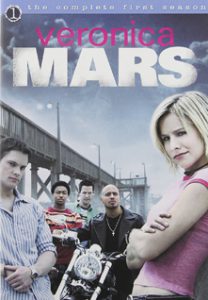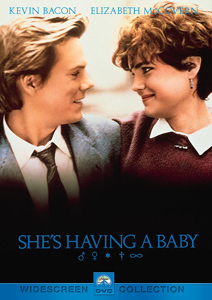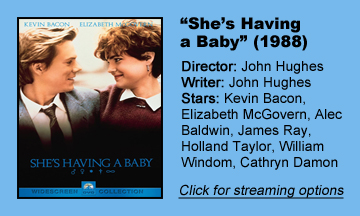John Hughes gets a little dark in “She’s Having a Baby” (1988), his sixth entry as a writer-director. Stuck between the well-trod tropes of high school and the delightful absurdities of family life, Hughes and his main character, Jake Briggs (Kevin Bacon), don’t know what they want out of this movie/life.
Jake is morose, with lots of forced smiles; his wife Kristy (Elizabeth McGovern) is hard to read; and their house is homey but ill-lit in that 1980s Midwest fashion. For most of its runtime, this isn’t a happy movie.
Dad’s perspective on pregnancy
It picks up big time in the final act, which features the helpless dad-to-be’s genuine fears about his wife’s complicated pregnancy and the brilliant needle drops we’ve come to expect from a Hughes film, particularly Kate Bush’s “This Woman’s Work” and Everything but the Girl’s “Apron Strings.” “SHAB” finally opens up its heart with a montage of the Briggses’ happy suburban life, and it makes me ache for a whole movie like that.
Hughes is clearly working out something through Jake, and he seems to have negotiated an inner peace by the end. Advertising copy writer and wannabe novelist Jake fears being a cliché, above all else.
The film’s overarching theme is illustrated in a dance montage showing the men on Jake’s suburban Chicago block mowing their lawns, with the wives bringing them lemonade. It’s a nightmare for Jake, but I couldn’t help thinking “What’s wrong with all that?”
I had the same impression during the block party (now there’s a blast from the ’80s). Sure, Jake’s neighbors (John Ashton and Larry Hankin) are annoyingly obsessed with their lawnmowers, but a neighborhood picnic on a summer day is such a nice thing, isn’t it? Nostalgia perhaps colors this movie differently than originally intended, making Jake seem a tad whiny.
Baldwin, ‘Fantasy Girl’ provide spark
That said, that nagging question of whether he’s doing the right thing with his life is nicely underscored during visits from his best pal, Davis (Alec Baldwin at his sexiest), now living large in New York. Davis says he misses his old friend, and he’s not referring to physical distance but contending that the friend he knew no longer exists.
(In the movie’s most underplayed subplot, Davis also has a thing for Kristy. Granted, if it was played up more, it would’ve changed the focus. But for a long stretch, “SHAB” desperately needs a wild spark.)
“SHAB” is hurt by that common issue in films that are a man’s vision: The leading woman isn’t a fully drawn character — even though the movie pours on appreciation for Kristy amid the closing drama. It’s partly the screenplay’s fault, but it’s hard to deny that McGovern is more of a head-scratching cipher than Jake’s life-direction question.
Kristy is kind of an ice queen but also has a Midwestern Joan Cusack accent, so she’s a pleasant Everywoman, I guess. At least we’re told she’s the nicest wife on the block. The bottom line is McGovern is too bland.

When Jake goes into dream sequence territory with Isabel García Lorca’s “Fantasy Girl” (as the credits call her), we know intellectually that Jake will stay with his wife because it’s morally correct and because he loves her.
But this is a top-shelf foreign-accented fantasy, so it’s not so emotionally clear; there’s certainly more of a conflict than in “Mr. Mom” or in Clark’s daydreams about the counter girl in “Christmas Vacation.” It’s a good thing that (most of? all of?) Jake’s interactions with Fantasy Girl take place in the dream realm.
Not elite, but interesting
“SHAB” is not one of Hughes’ elite films, but it’s one of his most interesting. It hits the obvious notes, such as Jake’s and Kristy’s parents (including William Windom’s Russ, almost an outright nemesis to his son-in-law) hounding them for grandchildren. But it keeps a viewer off balance; until the end, it’s not about pregnancy or babies but rather about Jake’s ennui.
A back-of-the-napkin account of “SHAB’s” theme is that a baby gives your marriage and your life purpose. Yet it’s commonly held that people should not have babies for that reason; rather, the couple should already be happy and want to share their happiness with kids.
With a lesser filmmaker, one might dismiss the film as having an outdated or even bad message, but since it comes from Hughes, I’m more inclined to see this as a subtle text. I can’t help but wonder what “She’s Having a Baby” would be like with a more vibrant character/actress as the wife, but Bacon is good enough that I can read Jake moving to a state of contentment between the lines.
And that final sequence breathes such fresh life and happiness into the cliché of birthing drama that one can’t help but feel good by the end – even if it is a slight cheat.


